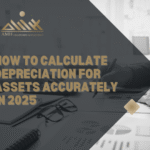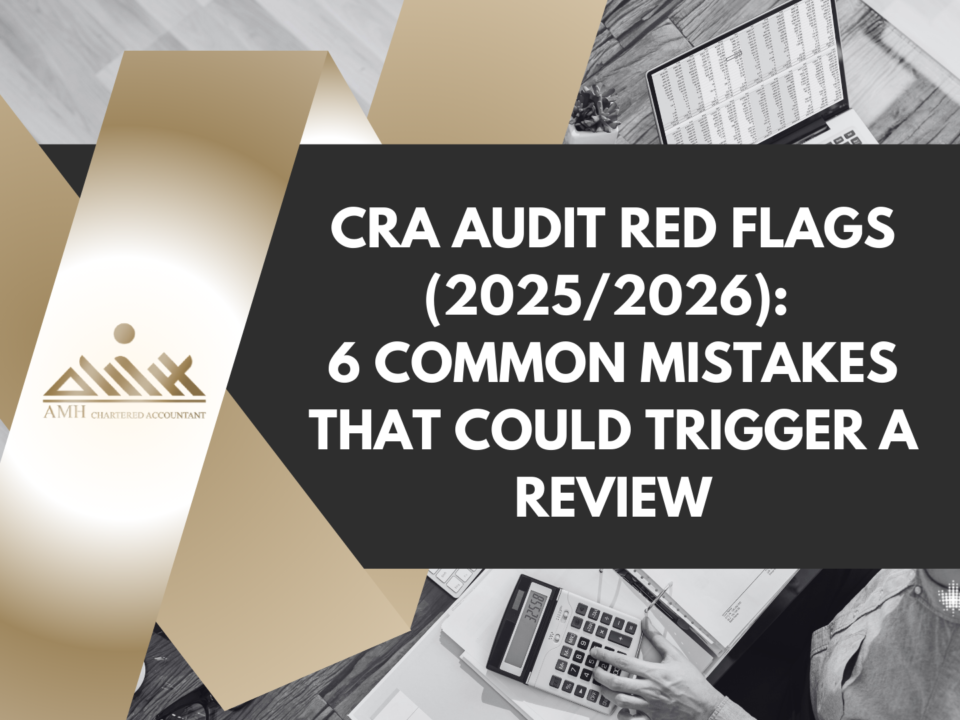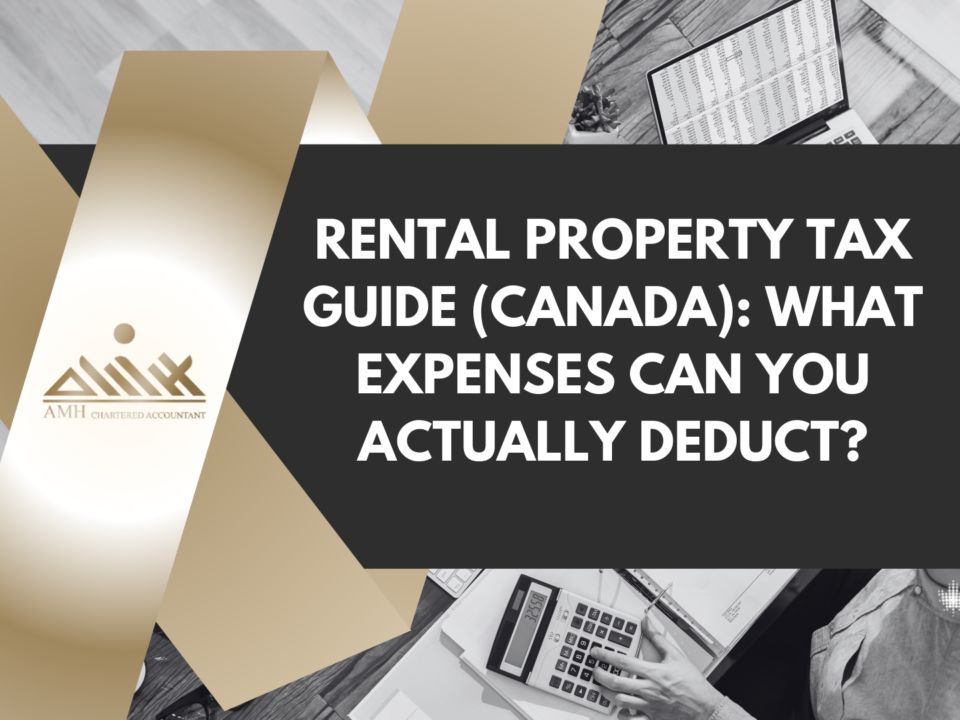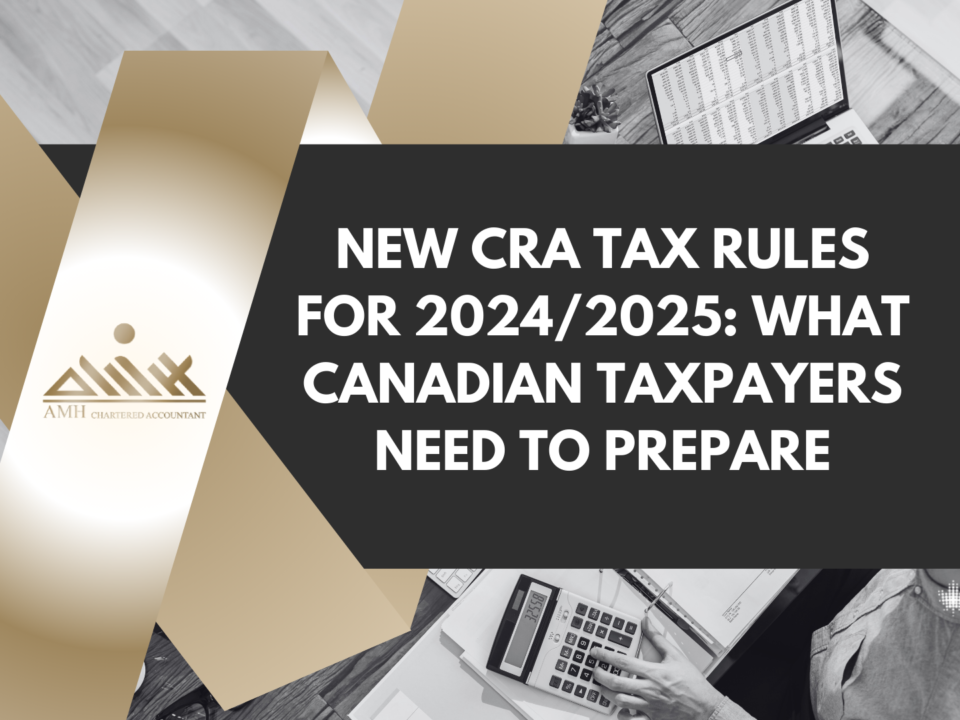
How to Calculate Depreciation for Assets Accurately in 2025
July 20, 2025
Using Profit and Loss Statements to Optimize Your Operating Costs
July 30, 2025CRA Audit Preparation Checklist for Corporations
Facing a CRA audit can be daunting, but with proper preparation, your corporation can navigate the process smoothly. At AMH Chartered Professional Accountant, we guide businesses in Toronto, Oakville, Milton, Hamilton, Kitchener, and the GTA through comprehensive audit preparation, ensuring compliance and minimizing risk.
Introduction: The Importance of CRA Audit Preparation
The Canada Revenue Agency (CRA) regularly audits corporations to ensure compliance with Canadian tax laws and regulations. A well-prepared corporation is less likely to face penalties, interest charges, or legal action during an audit. In fact, proper preparation can make the audit process more efficient and less stressful for everyone involved.
The key to a successful audit is maintaining comprehensive records and responding quickly to any requests for information. At AMH Chartered Professional Accountant, we provide a CRA audit preparation checklist to help businesses prepare for audits, ensuring they meet CRA requirements while protecting their financial interests.
What is a CRA Audit?
A CRA audit is a review of a corporation’s financial and tax records conducted by the Canada Revenue Agency to verify compliance with tax laws. Auditors examine your business’s financial statements, tax filings, and supporting documents to ensure that income, deductions, credits, and other claims are accurate and lawful.
There are several types of audits:
Desk Audits: These are simpler audits where the CRA requests documentation to review, and the process can often be handled by mail or online.
Field Audits: These are more in-depth audits where CRA auditors visit your business premises to inspect records, assets, and operations.
Regardless of the type, audits can be time-consuming and stressful, but with the right preparation, you can minimize disruptions and ensure that your corporation is in full compliance.
Reasons Why Corporations Get Audited by the CRA
Corporations are audited by the CRA for various reasons, including:
Random Selection: The CRA may select a corporation randomly for an audit, especially if it has recently undergone significant financial changes.
Red Flags on Tax Returns: Discrepancies, inconsistencies, or unusually high deductions on tax returns may prompt an audit.
Late or Incorrect Filings: Failing to submit tax returns on time or making errors in filing can lead to an audit.
Industry-Specific Risks: Certain industries, such as construction or small businesses, are often subject to more scrutiny due to the complexity or nature of their operations.
Tip-offs or Complaints: Sometimes, the CRA receives tips from third parties or employees regarding potential non-compliance.
Being proactive and ensuring your records are in order can reduce the likelihood of an audit and ensure that, if one does occur, it is manageable.
How to Respond to a CRA Audit Request
If the CRA selects your corporation for an audit, they will notify you in writing and request specific documentation. It’s important to:
Acknowledge the Audit Request: Respond promptly to the CRA’s notification to acknowledge receipt of their audit request.
Organize Your Records: Gather all necessary financial records, invoices, tax returns, and supporting documents as per the CRA’s requirements.
Communicate Clearly: Work closely with the auditor to provide the requested information and clarify any misunderstandings.
Seek Professional Help: It’s advisable to involve professionals like AMH Chartered Professional Accountant to assist you during the audit process.
CRA Audit Preparation Checklist for Corporations
Preparing for a CRA audit requires meticulous attention to detail and thorough documentation. Use this checklist to ensure you have everything in order before the audit begins:
1. Ensure Proper Record-Keeping and Documentation
Accurate and complete records are the cornerstone of audit preparation. The CRA will want to see evidence that supports the income, deductions, and claims on your tax return. Ensure that all documents are easily accessible and organized.
Income Records: Keep detailed records of sales, invoices, contracts, and bank deposits.
Expense Records: Maintain receipts, credit card statements, and other proof of business expenses.
Supporting Documents: Store contracts, loans, insurance policies, and any other legal documents that substantiate your claims.
2. Organize Your Financial Statements and Reports
Your financial statements (balance sheet, income statement, cash flow statement) should be up to date and prepared according to the applicable accounting standards (e.g., IFRS or ASPE). Ensure that your general ledger is accurate and matches your tax returns.
Verify Accuracy: Ensure there are no discrepancies between your bookkeeping records and your filed tax returns.
Reconcile Accounts: Regularly reconcile bank accounts, accounts payable, and accounts receivable to ensure consistency across your financial statements.
3. Review Your Tax Filings for Accuracy
Thoroughly review your tax returns and ensure all reported income, deductions, and credits are accurate. The CRA may scrutinize:
Revenue Claims: Ensure that all revenue streams are reported accurately.
Deductions and Credits: Verify that all claimed business expenses and tax credits are supported by proper documentation.
Previous Amendments: Review any previously amended returns to ensure consistency with the current filing.
4. Understand Your Deductions and Claims
The CRA will want to confirm that your deductions and credits align with tax laws. Common deductions that may be subject to audit include:
Business Expenses: Ensure all claimed expenses (e.g., office supplies, travel, meals) are supported by receipts and comply with CRA guidelines.
Capital Cost Allowance (CCA): Verify that your depreciation calculations and asset classifications are accurate and align with CRA rules.
GST/HST Claims: Ensure that you have properly accounted for GST/HST paid and collected, and that input tax credits (ITCs) are correctly claimed.
5. Prepare All Relevant Contracts and Agreements
The CRA may request copies of contracts, agreements, and other legal documents to validate your income, expenses, and business activities. These documents might include:
Supplier Agreements: Contracts with vendors that detail the terms of your purchases.
Employment Contracts: Agreements with employees, contractors, and subcontractors.
Leases and Rental Agreements: Proof of property or equipment leases.
Ensure these documents are readily available and organized.
6. Verify Your GST/HST Records and Filings
If your business is registered for GST/HST, the CRA will review your GST/HST filings and claims. Ensure that:
Sales and Purchases: Sales tax charged to customers and tax paid on purchases are accurately recorded.
Filing Consistency: Review your previous GST/HST returns for accuracy and completeness.
Reconciliation: Ensure that your GST/HST liabilities and credits are correctly reconciled.
7. Cross-Check Your Payroll and Employee Records
The CRA will also review your payroll records to ensure proper tax withholding and reporting. Ensure the following:
T4 and T4A Slips: Verify that all employee income and deductions are correctly reported on T4 or T4A slips.
Employee Benefits: Ensure that any taxable employee benefits are correctly reported.
Payroll Remittances: Cross-check your payroll tax remittances to confirm that all deductions (CPP, EI) have been paid.
8. Address Any Discrepancies in Your Books
If there are any discrepancies in your books, now is the time to resolve them. The CRA may question any inconsistencies between your financial statements, tax returns, and supporting documents. Ensure:
Reconciliation: Reconcile any discrepancies between your general ledger and bank accounts.
Adjustments: If any errors are found, make necessary adjustments and document the changes.
The Role of AMH Chartered Professional Accountant in Audit Preparation
At AMH Chartered Professional Accountant, we offer expert services to help your corporation prepare for a CRA audit. Our services include:
Audit Preparation: We assist in organizing and preparing all necessary documentation for a smooth audit process.
Compliance Review: Our team ensures that your financial statements, tax filings, and supporting documents are in full compliance with CRA regulations.
Audit Support: We provide guidance during the audit process, helping you respond to the CRA’s requests and avoid common audit pitfalls.
How AMH Can Assist in an Active CRA Audit
If your corporation is already under audit, AMH can provide active support, including:
Liaison with the CRA: We act as your liaison with CRA auditors, ensuring that all information is provided promptly and accurately.
Audit Defense: Our team can help defend your business against unfounded claims, discrepancies, or penalties.
Post-Audit Review: After the audit, we assist in addressing any issues raised and help you ensure ongoing compliance.
Common Mistakes to Avoid During a CRA Audit
Inconsistent Records: Ensure that your records are up to date and match across all platforms.
Failure to Provide Timely Responses: Be proactive in responding to audit requests to avoid delays or further scrutiny.
Misunderstanding Tax Deductions: Understand the eligibility criteria for all claimed deductions to avoid costly mistakes.
Best Practices for Ongoing CRA Compliance
Regular Record Updates: Keep your financial records updated and ensure they align with tax filings.
Timely Tax Filings: File your tax returns on time to avoid penalties and audits.
Consult Professionals: Work with a tax professional to ensure full compliance and identify potential areas of improvement in your tax strategy.
Conclusion: Minimizing Risks and Stress During a CRA Audit
CRA audits don’t have to be stressful if you are properly prepared. By following the CRA audit preparation checklist, maintaining accurate records, and seeking professional help, your business can navigate the audit process with confidence. At AMH Chartered Professional Accountant, we are dedicated to ensuring your business is prepared for any audit, minimizing risks, and helping you stay compliant with CRA regulations.
FAQs
How long does a CRA audit take?
The duration of a CRA audit depends on the complexity of the case and the responsiveness of the business. Generally, audits can last from a few months to over a year.
Can I appeal the results of a CRA audit?
Yes, if you disagree with the results of an audit, you can appeal the decision within a specific timeframe outlined by the CRA.
What should I do if I receive a CRA audit notice?
Respond promptly and begin organizing the requested documentation. Consult with a professional, such as AMH Chartered Professional Accountant, for assistance with audit preparation.
Do I need to hire a lawyer for a CRA audit?
Hiring a lawyer is not always necessary, but you may want to consult a tax professional, such as an accountant from AMH Chartered Professional Accountant, to help guide you through the process.




